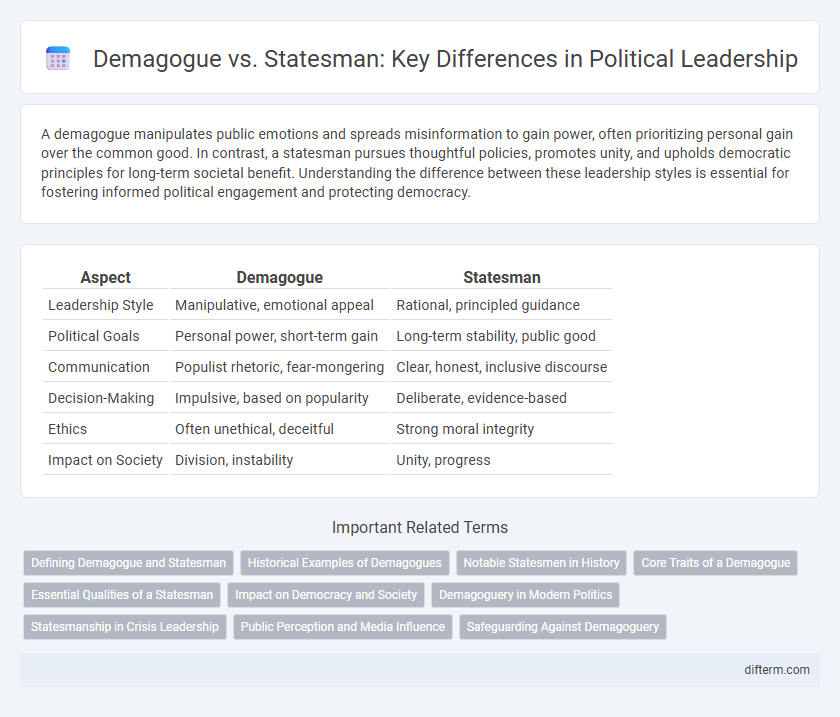A demagogue manipulates public emotions and spreads misinformation to gain power, often prioritizing personal gain over the common good. In contrast, a statesman pursues thoughtful policies, promotes unity, and upholds democratic principles for long-term societal benefit. Understanding the difference between these leadership styles is essential for fostering informed political engagement and protecting democracy.
Table of Comparison
| Aspect | Demagogue | Statesman |
|---|---|---|
| Leadership Style | Manipulative, emotional appeal | Rational, principled guidance |
| Political Goals | Personal power, short-term gain | Long-term stability, public good |
| Communication | Populist rhetoric, fear-mongering | Clear, honest, inclusive discourse |
| Decision-Making | Impulsive, based on popularity | Deliberate, evidence-based |
| Ethics | Often unethical, deceitful | Strong moral integrity |
| Impact on Society | Division, instability | Unity, progress |
Defining Demagogue and Statesman
A demagogue exploits popular emotions and prejudices to gain power, often using rhetoric that manipulates fear and hatred rather than reasoned debate. A statesman, contrastingly, employs wisdom, foresight, and integrity to craft policies that serve the long-term welfare of the state, prioritizing unity and justice over short-term gains. Defining these roles highlights the difference between leadership driven by divisive tactics versus principled governance.
Historical Examples of Demagogues
Historical examples of demagogues, such as Julius Caesar, Adolf Hitler, and Joseph McCarthy, illustrate how charismatic leaders manipulate public fears and prejudices to gain power through emotional appeals rather than reasoned debate. These figures often exploit societal divisions and use rhetoric that promotes populism and authoritarianism, contrasting sharply with statesmen who prioritize long-term governance, diplomacy, and the public good. The rise of demagogues frequently correlates with periods of political instability, economic crisis, or social upheaval, highlighting the vulnerability of democratic institutions to demagogic leadership.
Notable Statesmen in History
Notable statesmen such as Winston Churchill and Abraham Lincoln exemplify leadership grounded in vision, integrity, and commitment to the public good, contrasting sharply with demagogues who exploit emotions and division for power. Churchill's resolute leadership during World War II and Lincoln's dedication to unity and abolition of slavery highlight statesmanship that shapes enduring democratic institutions. Their legacies underscore the importance of principled governance over populist manipulation in achieving sustained national progress.
Core Traits of a Demagogue
A demagogue manipulates public emotions through fear, anger, and prejudice, often exploiting societal divisions to gain power. Core traits include charismatic rhetoric, appeals to popular desires, and rejection of rational discourse or factual evidence. Unlike statesmen who prioritize long-term governance and unity, demagogues prioritize short-term gains and personal influence.
Essential Qualities of a Statesman
A statesman embodies wisdom, integrity, and a commitment to the common good, prioritizing long-term national interests over personal or sectional gain. Unlike a demagogue who exploits emotions and divisions for power, a statesman fosters unity, stability, and prudent decision-making based on informed judgment and ethical principles. Essential qualities include visionary leadership, diplomatic skill, and resilience in navigating complex political landscapes.
Impact on Democracy and Society
Demagogues often exploit populist rhetoric and emotional appeals, undermining democratic institutions and polarizing societies, while statesmen prioritize long-term governance, fostering social cohesion and institutional stability. The impact of demagoguery typically results in weakened checks and balances, increased misinformation, and erosion of public trust in democratic processes. In contrast, statesmanship strengthens democratic resilience by promoting inclusive dialogue, safeguarding rights, and encouraging informed civic participation.
Demagoguery in Modern Politics
Demagoguery in modern politics exploits emotional appeals, misinformation, and populist rhetoric to manipulate public opinion and gain power. Demagogues often undermine democratic institutions by promoting division, scapegoating minorities, and rejecting factual discourse, which threatens societal stability. Understanding the rise of demagogic figures is crucial for safeguarding democratic values and fostering informed civic engagement.
Statesmanship in Crisis Leadership
Statesmanship in crisis leadership embodies foresight, balanced judgment, and a commitment to long-term stability over short-term populism. Effective statesmen prioritize evidence-based decision-making and empathetic communication to navigate uncertainty and maintain public trust. Their ability to unite diverse stakeholders under a shared vision ensures resilient governance during turbulent times.
Public Perception and Media Influence
Public perception of demagogues often thrives on emotional appeals and sensationalized media coverage, which amplifies their ability to mobilize mass support through fear or populist rhetoric. In contrast, statesmen are typically portrayed in media as thoughtful leaders who prioritize long-term policy solutions and stability, though their measured approach may receive less immediate attention. Media influence shapes these narratives by either magnifying demagogic tactics for ratings or highlighting the statesman's commitment to governance, thus affecting public trust and political engagement.
Safeguarding Against Demagoguery
Safeguarding against demagoguery requires promoting critical media literacy and fostering transparent, accountable governance that empowers citizens to discern manipulative rhetoric from principled leadership. Implementing robust institutional checks and balances, alongside independent judiciary systems, curbs the concentration of power exploited by demagogues to undermine democratic norms. Civic education emphasizing democratic values and the historical consequences of demagoguery strengthens societal resilience against populist manipulation and authoritarian tendencies.
demagogue vs statesman Infographic

 difterm.com
difterm.com